Does your dog approach you whenever you’re snacking on your favourite nuts? Does he plead with you to give him some using his puppy dog eyes? It may seem harmless to give him a few pieces to munch on, but the wrong kind may actually cause irreparable damage. In this blog post, Waldo’s Friends breaks down:
- What are nuts?
- Are nuts essential in a dog’s diet?
- Which nuts are safe for dogs?
- Which nuts are harmful for dogs?
- When feeding dogs nuts, what else should you remember?
A quick reminder for dog lovers and pet parents: this article should not replace a consultation with your veterinarian or pet nutritionist.
What are nuts?
Considered as fruits, nuts are dry, edible kernels or seeds contained in hard-walled shells. Low in water and carbohydrates, these plant-based foods are great sources of energy. They’re packed with various nutrients such as vitamin E, folate, omega-3 fatty acids, and fiber. In addition, you can derive essential minerals such as magnesium, phosphorus, and potassium by eating them.
Nuts can come from different kinds of plant sources. Depending on the species, they may have spiny, leafy, tube-shaped, or scaly outer structures. True nuts, such as chestnuts and hazelnuts, come from pistils of plants with inferior ovaries. Meanwhile, almonds, pecans, and macadamia nuts are drupes contained within indehiscent fleshy fruits. Peanuts, on the other hand, are legumes that grow underground.
Are nuts essential in a dog’s diet?
Dogs are omnivores that can eat a mixture of meat and plant-based food. Just like pet cats, they need to eat specially formulated meals that match their age, weight, size, daily activities, and special needs. Each serving should contain the correct ratio of protein, fats, carbohydrates, vitamins, and minerals prescribed by his veterinarian. For example, a puppy needs to eat meals that help support his rapid growth until he reaches 90% of his expected adult weight. An elderly dog needs more fiber and less calories and fat as his metabolism and daily activities both decrease with age.
Aside from dry kibble or wet food, dogs can eat certain food consumed by humans to complement their diets. These include meats, seafood, fruits, vegetables, grains, herbs, and spices. But just because it’s safe for us, doesn’t mean it’s automatically safe for your canine pet.
Therefore, it’s highly recommended that you speak with your vet before feeding nuts (or anything new for that matter!) to your dog. Once you get the doctor’s go signal, let your pooch try a tiny, bite-sized piece of the new food. Observe him for symptoms over the next 24 hours, then slowly integrate it into his diet if he doesn’t react badly to it.
When fed to your dog right, non-toxic nuts can provide the following:
- Protein – Essential amino acids help with his overall functions such as muscle development, blood circulation, and cell repair
- Fiber – Good for dogs experiencing constipation
- Vitamin C – Helps strengthen his immune system
- Potassium – Assists in reducing blood pressure
- Vitamins B1 and B2 – Counters fatigue and stimulates the appetite
However, it’s important to remember that:
- Nuts are high in fat and calories. If he eats nuts regularly, he may gain weight, become obese, or suffer from pancreatitis (the inflammation of the pancreas).
- Your dog may experience airway or intestinal blockage due to the size, shape, and hardness of the consumed nut.
- Gastrointestinal tearing may occur if the hard shells are eaten.
- Stomach upset may manifest in dogs that have a hard time digesting non-toxic nuts.
- Though uncommon, some dogs may be allergic to certain types of nuts.
Note that not all nuts are safe for dogs. Check out our list below to see what you can feed your pooch in moderation.
Which nuts are safe for dogs?
Aside from consulting with your vet on which kinds of nuts you can give, you should watch over him as he eats them. Always stick with giving the plain varieties of non-toxic nuts. Feeding nuts mixed with salt, sugar, garlic, onions, herbs, and spices, as well as those coated with chocolate may be lethal for him. Additionally, refrain from giving your dog old and moldy nuts that can cause poisoning.
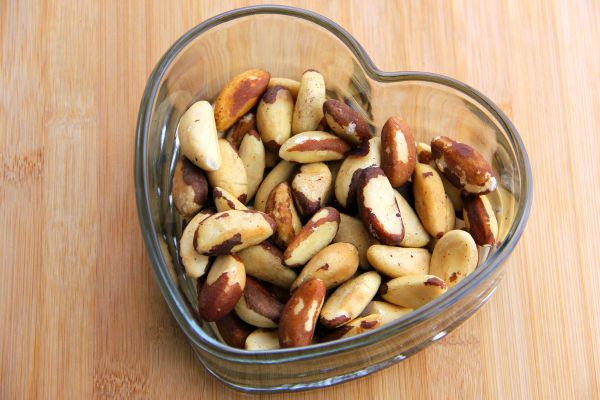
Brazil nuts
The nut with the highest fat content, Brazil nuts should only be given to dogs with no history of hyperlipidemia or pancreatitis. Just one piece could be dangerous for small-sized dogs. Plus, its size can cause gastrointestinal blockage for smaller breeds.
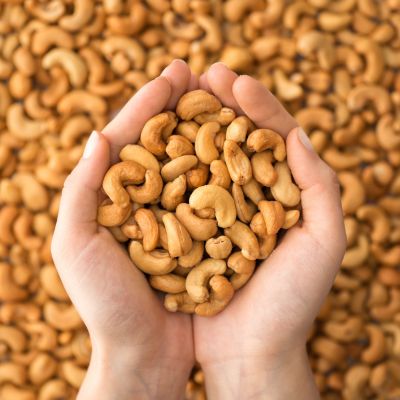
Cashews
Never give your pooch raw cashews. Only plainly cooked or roasted ones should be fed to him. Canines with sensitive stomachs or pancreatitis should not eat cashews. Stomach upset, vomiting, and diarrhea may occur post-consumption.
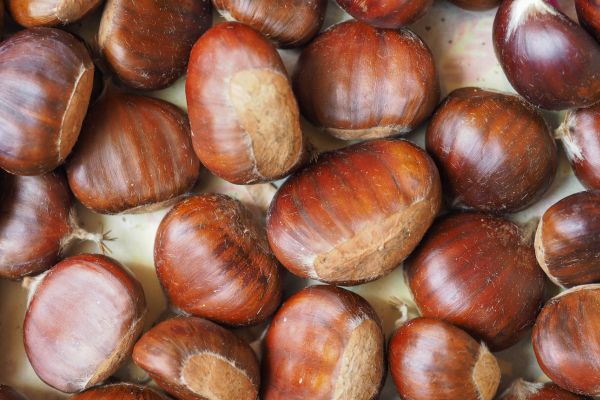
Chestnuts
Roasted chestnuts can be given as snacks during the holiday season. Just make sure the fiber-rich snack isn’t seasoned or flavoured.

Peanuts
Unshelled peanuts can be given to your pet whether in raw or plainly cooked form. The unsalted variety is highly recommended. The legume actually helps with nitric oxide production, which assists your dog’s circulatory system.
When it comes to peanut butter, refrain from giving him ones flavoured with salt and xylitol. Peanut butter with the latter ingredient can cause life-threatening effects.
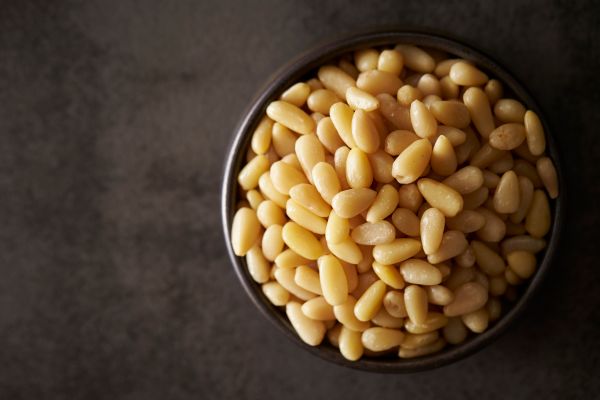
Pine nuts
High in fat and phosphorus, pine nuts should be given to your canine pet sparingly. When given regularly, stomach upset, pancreatitis, and hyperphosphatemia may develop.
Which nuts are harmful for dogs?
The following nuts should not be given to canine pets as they may cause mild to severe poisoning:
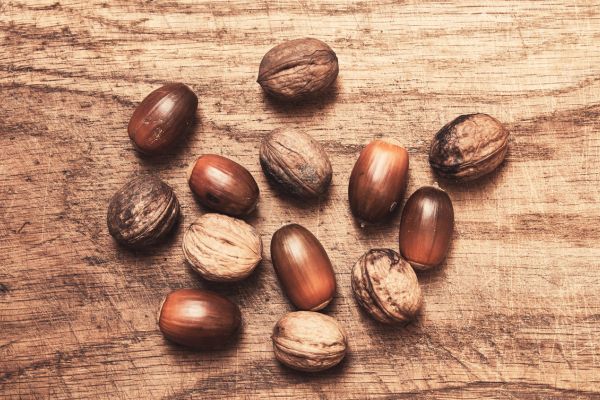
Acorns
Since these nuts come from oak trees or shrubs, they are also called oaknuts. In large amounts, the tannins present in acorns (especially higher in immature ones) can cause upset stomach, liver damage, and kidney failure.

Almonds
It’s best to avoid feeding your dog almonds. Aside from potentially blocking your dog’s gastrointestinal system, the nut can cause pancreatitis.
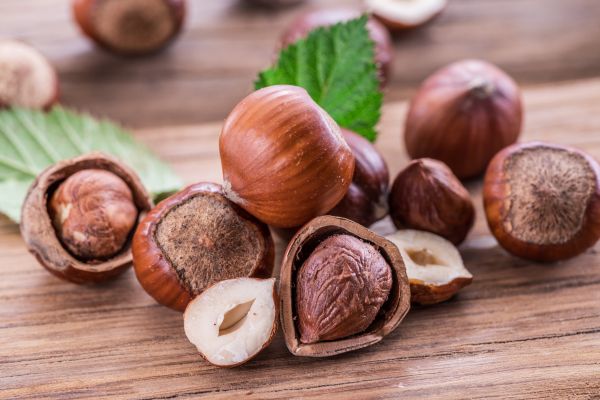
Hazelnuts
Some sources state that it is risky to share hazelnuts with dogs since these may have mycotoxins and juglone. Plus, the nut’s size can also cause choking (in small to medium-sized dogs) or intestinal blockage (in larger dogs that gobble them up without chewing). However, if he accidentally eats one or two unflavoured pieces, he should be fine.
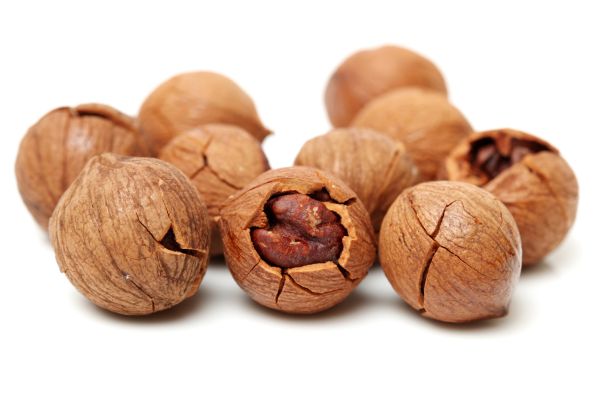
Hickory nuts
Though the hickory nut itself is non-toxic, the chemical juglone is present in the shells and other parts of the tree. In large quantities, hickory nut consumption can bring about stomach upset and/or intestinal obstruction. Plus, moldy hickory nuts may also contain tremorgenic mycotoxins.

Macadamias
Your dog may feel unwell after eating a few pieces of macadamia nuts. They have unknown toxins that can trigger weakness, loss of muscle control, vomiting, tremors, hyperthermia, fever, as well as depression.
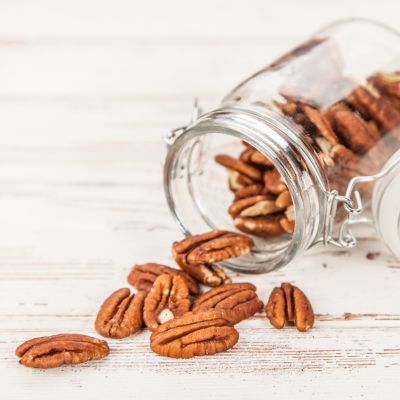
Pecans
The toxin juglone is found in pecans. This can cause vomiting, restlessness, fever, diarrhea, seizures, and tremors in dogs. Letting your pup consume moldy pecans is a bigger health risk. It may lead to seizures and other neurological complications.

Pistachios
Dogs should not consume pistachios for a number of reasons. When eaten, the sharp edges and size of the nut may cause gastrointestinal injury as well as blockage. Plus, regular consumption may develop complications such as pancreatitis, obesity, and liver damage.

Walnuts
Contained in thick-walled shells, walnuts should never be fed to dogs as they can accidentally cause choking and intestinal blockage. Similar to moldy pecans, the tremorgenic mycotoxins in moldy walnuts can cause neurological symptoms.
Black walnuts are highly toxic to dogs. Though English walnuts are the safest kind of walnuts dogs can eat, they are also prone to molding. Plus, they’re high in fat and difficult to chew and digest.
When feeding dogs nuts, what else should you remember?
When given as a snack, nuts and other food should not go over 10% of your dog’s total daily diet. The 90% should always come from nutritionally balanced meals. Consult with your vet to find out how much nuts you can give based on your pooch’s physical makeup and health conditions.
Remember that nuts should not replace the protein component of your dog’s diet. Since these are derived from plants, the nutrients he may get from eating them on their own may not be as substantial if he were to eat animal-derived protein.
If you suspect that your dog ate a toxic nut, contact your veterinarian immediately. Common symptoms of nut poisoning include weakness, depression, vomiting, diarrhea, tremors, and seizures. On the other hand, these are the signs of airway obstruction: distress, pawing at the mouth, salivation, coughing, gagging or retching, cyanosis (blue mucous membranes), and rubbing their face against the ground.
Browse our “can dogs eat” category to learn more ways you can responsibly feed your canine pet. Or explore the list of pet-friendly plants you can grow around your dog.
Leave a comment
Your email address will not be published. All fields are required.